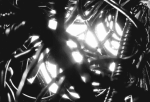More from “Forge of Darkness”. It is frustrating, because extrapolating quotes can diminish their power.
Haut nodded. ‘Listen well. You are right to not conflate the symbol with the meaning; but you are wrong in thinking that to do so is uncommon.’
‘The older you get,’ she said, in a tone that made her seem eye to eye with his grandmother, ‘the more you discover the truth about the past. You can empty it. You can fill it anew. You can create whatever truth you choose. We live long, Orfantal – much longer than the Jheleck, or the Dog-Runners. Live long enough and you will find yourself in the company of other liars, other inventors, and all that they make of their youth shines so bright as to blind the eye. Listen to their tales, and know them for the liars they are – no different from you. No different from any of us.’
‘But dear, we are its eyes. Here atop the Old Tower. We are the city’s eyes just as we are the world’s eyes, and that is a great responsibility, for it is only through us that the world is able to see itself, and from sight is born mystery – the releasing of imagination – and in this moment of recognition, why, everything changes.’
A promise of depth and distance, yet one in which the promise remained sacred, for neither depth nor distance could be explored.
to look upon oneself in this mirror-world was to witness every truth; and find nowhere to hide.
‘A will crumbled helpless to the assault of revelation. When we are driven to our knees, the world shrinks.’
Behind them T’riss spoke up, her voice carrying with unnatural clarity. ‘In ritual you abased yourselves. I saw it in the courtyard, many times. But the gesture was rote – even in your newfound fear, the meaning of that abasement was lost.’
‘Please,’ growled Resh, ‘explain yourself, Azathanai.’
‘I will. You carve an altar from stone. You paint the image of waves upon the wall and so fashion a symbol of that which you would worship. You give it a thousand names, and imagine a thousand faces. Or a single name, a single face. Then you kneel, or bow, or lie flat upon the ground, making yourselves abject in servitude, and you may call the gesture humble before your god, and see in your posture righteous humility.’
‘This is all accurate enough,’ said Resh.
‘Just so,’ she agreed. ‘And by this means you lose the meaning of the ritual, until the ritual is itself the meaning. These are not gestures of subservience. Not expressions of the surrendering of your will to a greater power. This is not the relationship your god seeks, yet it is the one upon which you insist. The river god is not the source of your worship; or rather, it shouldn’t be. The river god meets your eye and yearns for your comprehension – not of itself as a greater power, but comprehension of the meaning of its existence.’
consider this: it is only when opposed that some things find definition. Few would argue, I think, that Darkness is a difficult thing to worship. What is it we seek in elevating Mother Dark? What manner of unity can we find circling a place of negation?

